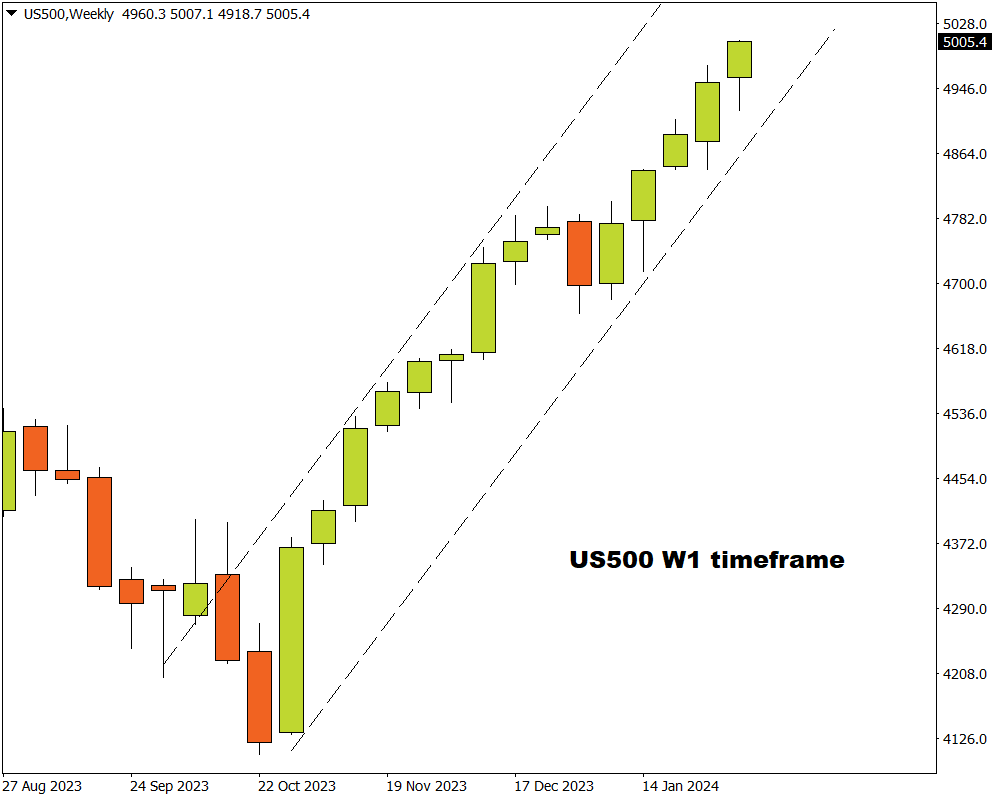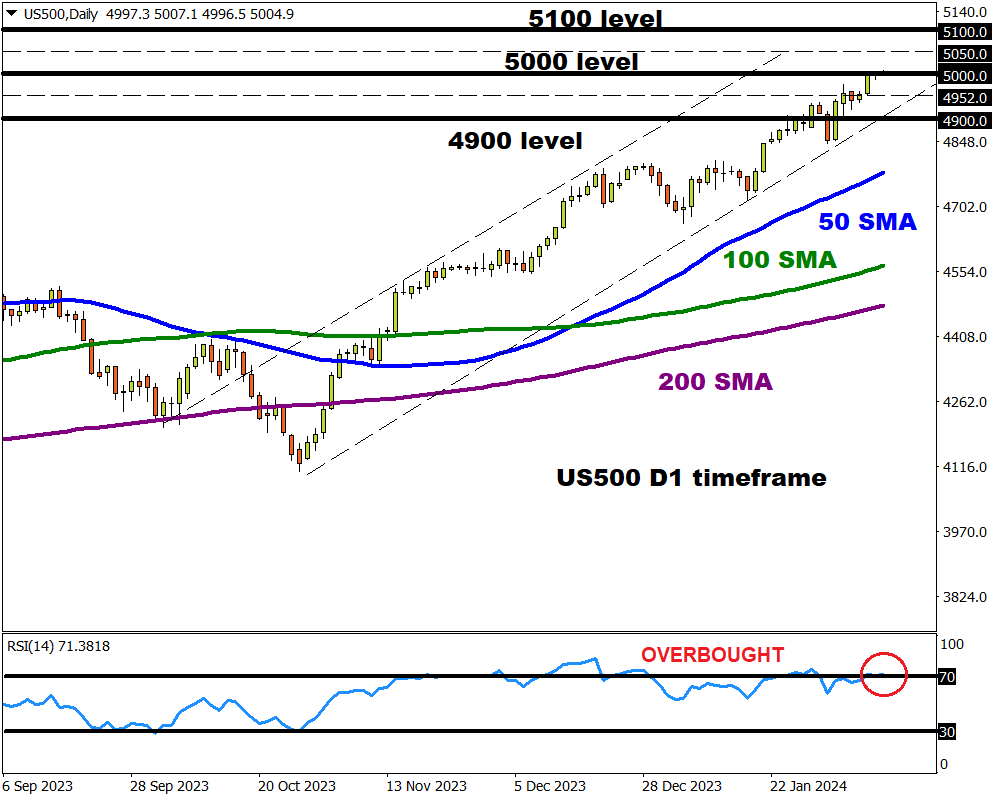Note: This report was published before the US CPI revisions.
- US500 up almost 5% YTD
- Index could be influenced by US CPI
- Watch out for Fed speeches + retail sales
- Bulls remain in control on D1/W1 timeframe
- Keep eye on key 5000 level
The US500, which tracks the benchmark S&P500 is up nearly 5% year-to-date and heading for its fifth consecutive week of gains.
After breaching 5,000 for the first time, can US500 bulls maintain their drive for gains?
While bulls seem to be in control, the incoming US inflation report among other key data points and speeches by Fed officials could impact the index in the week ahead:
Monday, 12th February
- USD: Minneapolis Fed President Neel Kashkari speech
- GBP: Bank of England Governor Andrew Bailey speech
Tuesday, 13th February
- AUD: Australia consumer confidence
- EUR: Germany ZEW survey expectations
- GBP: UK jobless claims, unemployment
- USD: US January CPI report
- US500: Coca-Cola earnings
Wednesday, 14th February
- EUR: Eurozone industrial production, GDP
- GBP: UK January CPI report
- USD: Chicago Fed President Austan Goolsbee speech
Thursday, 15th February
- AUD: Australian unemployment
- JPY: Japan GDP, industrial production
- GBP: UK industrial production, GDP
- USD: US Empire manufacturing, industrial production, retail sales, Atlanta Fed President Raphael Bostic speech
Friday, 16th February
- NZD: New Zealand PMI
- USD: PPI, University of Michigan consumer sentiment, San Francisco Fed President Mary Daly speech
Just looking at the charts, the US500 has been on a roll – notching a string of all-time highs over the past few weeks thanks to upbeat data and strong corporate earnings.

With all the above said, it will be wise to keep a tab on not only the incoming US CPI revisions this afternoon, but the January US Consumer Price Index (CPI) data published on Tuesday 13th February.
Markets are forecasting:
- CPI year-on-year (January 2024 vs. January 2023) to cool 2.9% from 3.4% in the prior month.
- Core CPI year-on-year to cool 3.7% from 3.9% in the prior month.
- CPI month-on-month (January 2024 vs December 2023) to cool 0.2% from 0.3% in the prior month.
- Core CPI month-on-month to remain unchanged at 0.3% from 0.3% seen in December 2023.
Headline inflation is expected to fall 2.9% while the annual core inflation is seen cooling to 3.7% - its lowest since May 2021.
-
US CPI may trigger fresh volatility
Market expectations around when the Federal Reserve will start cutting interest rates have been one of the key forces influencing the US500.
Traders are currently pricing in a 73% probability of a 25-basis point cut by May with a cut fully priced in by June, according to Fed fund futures.
Given how the incoming inflation data may impact these bets, it is likely to be reflected in the index.
- The US500 could push higher if the US CPI report shows further evidence of cooling price pressures.
- Should the inflation figures print above market expectations, this may pull the US500 lower.
-
Key US data + Fed speeches
Beyond the US CPI report, much attention will be directed towards the latest retail sales figures along with other data points for insight into the health of the US economy. A selection of Fed speakers will also be in focus which may offer additional clues on when the Fed will start cutting interest rates. When considering how the US500 has a handful of tech stocks that remain sensitive to interest rates, this could mean more volatility for the index.
- Should overall US data and Fed speakers support expectations around lower US interest rates, this could propel the US500 higher.
- If US economic data and Fed officials prompt investors to scale back rate cut bets, this may send the index lower.
-
Technical forces
The US500 is firmly bullish on the daily timeframe due to the consistently higher highs and higher lows. Although prices are trading well above the 50, 100 and 200-day SMA, the Relative Strength Index (RSI) signals that prices are heavily overbought.
- A solid weekly close above the 5000 level may open a path to the next psychological level at 5050 and 5100, respectively.
- Should 5000 prove to be a tough resistance, this may trigger a decline back towards 4952 and 4900.
